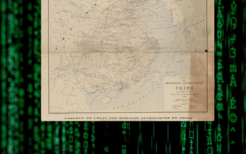A Digital Global Legal History of Missionary Cases in Late Qing China (1860-1911)
Forschungsprojekt

This Partner Group ‘Mapping Conflicts’, under the leadership of Dr. Fupeng Li, at the China University of Political Science and Law in Beijing, PR China, and Prof. Dr. Thomas Duve, director of the Max Planck Institute for Legal History and Legal Theory in Frankfurt am Main, aims to explore the production of normative knowledge in the context of conflicts about Christian missions in the late Qing China (1860-1911). By using digital technologies, the project not only collects information about Chinese sources and makes this information accessible for research. It also examines patterns and mechanisms underlying the Chinese officials’ handling of these missionary-related cases (jiao’an). Its results will contribute to the intellectual project of a history of the globalization and localization of law – the so called “Glocalization” – carried out at the department “Historical Regimes of Normativity” led by Thomas Duve in cooperation with local partners in the Americas, Africa, and Asia.
In the late 19th century, preaching Christianity in China expanded from major portal cities to the entire Qing empire. With both Catholic and Protestant missionaries arriving in China in larger numbers, this new wave of preaching and Christian expansion brought about considerable changes of the previously soft strategies of Christian mission by cultural accommodation adopted by the Jesuits in their early Christian mission to China (1583-1800). Due to the forced opening of Chinese territories for Western powers, this new missionary activity spread out from five portal cities (as agreed in the Treaty of Nanjing 1842) to the entire territory of the Qing empire (as agreed in the Convention of Peking, 1860).
The massive and quick expansion of Christianity in China challenged traditional rules at the local level and led to considerable tensions between Christian missionaries, converts and local communities. Many conflicts, legal negotiations and lawsuits emerged. A number of approximately 1700 cases were recorded as so-called 'missionary cases' or 'religious cases' (jiao’an) between Christian converts and non-converts. These missionary cases provide insights into the handling of these cases by Chinese officials and are a key to understand the local negotiations and translations (in the sense of cultural translation) of normative knowledge of Western and Chinese actors.
The project will use the holdings of the archives of the Office for the General Management of Affairs (zongliyamen) (1861-1910) and the Ministry of Foreign Affairs (waiwubu) in China (1901-1911), totalling more than 30,000 pages, as the backbone of the project. It is intended to complement these sources with the holdings from other archives, for example in the Vatican Archives, where the MPI for Legal History and Legal Theory is carrying out a mayor project on the Congregation of the Council (led by Benedetta Albani). As the Christian missionary in China was geographically partitioned into different regions by different countries, the recording of these conflicts was also documented in numerous letters, diaries, and reports, which are currently archived across many different countries – from the Vatican to China, together with some other European and American countries.
With the advancement of technology in digital humanities, this project will digitise and further explore the constructive layering and texture of the administrative-judicial documents. Moreover, the digitalisation of these materials allows us to examine how the foreign powers operated in China and how Chinese officials responded throughout the negotiations with foreign powers. From the presentation, format and procedural or bureaucratic margin notes across these archival materials, we will explore how the governance of Qing empire was reconfigured in the late Qing period. Moreover, we will also examine these files by time, space, institution, subject, and elements pertaining to the conflict (e.g. types of cases, applicable procedures, normative sources, solutions etc.), as well as other relevant external factors (e.g. disasters, diseases, wars etc.). This information will be used to deliver a historical-geographical database that allows to uncover a wide variety of correlations across these documents. In short, a digital approach to the study of global legal history not only enables us to see more details about that which we already know, but also uncovers aspects we do not yet know.
In order to explore common areas of interest in the fields of law, history and digital humanities, the Partner Group ‘Mapping Conflicts’ is working closely with the MPI for the History of Science, Berlin (Department III, led by Dagmar Schäfer), especially in the development of the Chinese Missionary Cases Database (CMCD).


